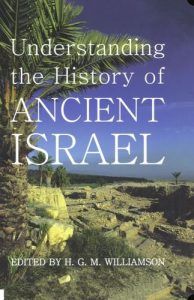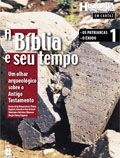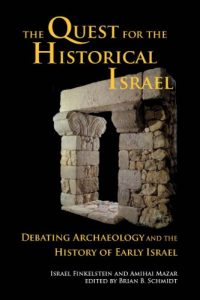Chegou ontem, enviado pela Amazon.com, o meu exemplar do livro de GRABBE, L. L. Ancient Israel: What Do We Know and How Do We Know It? London: T & T Clark, 2007, xx + 306 p. – ISBN 9780567032546.
O Antigo Israel: o que sabemos e como sabemos?
Lester Grabbe chegou bem no momento em que estou para começar o meu curso de História de Israel 2008. Que passo a descrever abaixo. Observo que as novidades em relação ao ano passado estão sobretudo na bibliografia.
Este curso de História de Israel compreende 4 horas semanais, com duração de um semestre, o primeiro dos oito semestres do curso de Teologia. Aos alunos são distribuídos um roteiro impresso do curso e um CD com os roteiros de todos as minhas disciplinas do ano em curso. Os sistemas de avaliação e aprendizagem seguem as normas da Faculdade e são, dentro do espaço permitido, combinados com os alunos no começo do curso.
I. Ementa
Discute com o aluno os elementos necessários para uma compreensão global e essencial da história econômica, política e social do povo israelita, como base para um aprofundamento maior da história teológica desse povo. Possibilita ao aluno uma reflexão séria sobre o processo histórico de Israel desde suas origens até o século I d.C.
II. Objetivos
Oferece ao aluno um quadro coerente da História de Israel e discute as tendências atuais da pesquisa na área. Constrói uma base de conhecimentos histórico-sociais necessários ao aluno para que possa situar no seu contexto a literatura bíblica vétero-testamentária produzida no período.
III. Conteúdo Programático
1. Noções de geografia do Antigo Oriente Médio
- O Crescente Fértil
- A Mesopotâmia
- A Palestina e o Egito de 3000 a 1700 a.C.
- A Síria e a Fenícia
- A Palestina
2. As origens de Israel
- A teoria da conquista
- A teoria da instalação pacífica
- A teoria da revolta
- A teoria da evolução pacífica e gradual
3. Os governos de Saul, Davi e Salomão
- Nascimento e morte da monarquia a partir dos textos bíblicos
- A ruptura do consenso
- As fontes: seu peso, seu uso
- Dois exemplos de fontes primárias: as estelas de Tel Dan e de Merneptah
- A questão teórica: como nasce um Estado antigo?
- As soluções de Lemche e Finkelstein & Silberman
4. O reino de Israel
- Israel de Jeroboão I a Jeroboão II
- A Assíria vem aí: para Israel é o fim
- As conclusões de Finkelstein & Silberman
5. O reino de Judá
- Os Reis de Judá
- A reforma de Ezequias e a invasão de Senaquerib
- A reforma de Josias e o Deuteronômio
- Os últimos dias de Judá
- Por que Judá caiu?
6. A época persa e as conquistas de Alexandre
- A situação da Grécia e a política macedônia
- As conquistas de Alexandre Magno (356-323 a.C.)
- Quem é Alexandre Magno?
- A anexação da Judéia por Alexandre
- A situação da Judéia no momento da anexação
7. Os Ptolomeus governam a Palestina
- Os Diádocos lutam pela herança de Alexandre
- A situação da Palestina de 323 a 301 a.C.
- As guerras sírias entre Ptolomeus e Selêucidas
- Alexandria e os judeus
- O governo dos Ptolomeus
- A administração ptolomaica da Palestina
8. Os Selêucidas: a helenização da Palestina
- O governo de Antíoco III, o Grande
- Antíoco IV e a proibição do judaísmo
- As causas da helenização
9. Os Macabeus I: a resistência
- Matatias e o começo da revolta
- A luta de Judas Macabeu (166-160 a.C.)
- Jônatas, o primeiro Sumo Sacerdote Macabeu (160-143 a.C.)
10. Os Macabeus II: a independência
- Simão consegue a independência da Judéia
- João Hircano I e as divisões internas dos judeus
- Aristóbulo I e a reaproximação com o helenismo
- Alexandre Janeu, o primeiro rei macabeu
- Salomé Alexandra e o poder dos fariseus
- Aristóbulo II e a intervenção de Pompeu
11. O domínio romano
- A “Pax Romana” chega a Jerusalém
- O sistema sócio-econômico da Palestina no século I d.C.
- A organização político-religiosa da Palestina
IV. Bibliografia
Básica
DA SILVA, A. J. A história de Israel na pesquisa atual. In: História de Israel e as pesquisas mais recentes. 2. ed. Petrópolis: Vozes, 2003. 181 p. – ISBN 8532628281, p. 43-87.
DONNER, H. História de Israel e dos povos vizinhos. 2v. 4. ed. São Leopoldo: Sinodal/Vozes, 2006, 535 p. – ISBN vol. I:8523304649; ISBN vol. II:8523304657.
FINKELSTEIN, I.; SILBERMAN, N. A. A Bíblia não tinha razão. São Paulo: A Girafa, 2003, 515 p. – ISBN 8589876187.
Complementar
BRIEND, J. (org.) Israel e Judá: textos do Antigo Oriente Médio. 2. ed. São Paulo: Paulus, 1997, 104 p. – ISBN 8534905908.
CURTIS, A. Oxford Bible Atlas. 4. ed. New York: Oxford University Press, 2007, 224 p. – ISBN 9780191001581.
DA SILVA, A. J. A história de Israel na pesquisa atual. Estudos Bíblicos, Petrópolis, n. 71, p. 62-74, 2001. Artigo disponível online.
DA SILVA, A. J. A história de Israel no debate atual. Artigo na Ayrton’s Biblical Page.
DA SILVA, A. J. A origem dos antigos Estados israelitas. Estudos Bíblicos, Petrópolis, n. 78, p. 18-31, 2003.
DA SILVA, A. J. Manuscritos do Mar Morto: recursos para estudo. Disponível no Observatório Bíblico.
DA SILVA, A. J. Manuscritos do Mar Morto: resenhas na RBL. Indicações no Observatório Bíblico.
DA SILVA, A. J. O Pentateuco e a História de Israel. In: Teologia na pós-modernidade. Abordagens epistemológica, sistemática e teórico-prática. São Paulo: Paulinas, 2003, 496 p. – ISBN 853561110X, p. 173-215.
DA SILVA. A. J. Os essênios: a racionalização da solidariedade. Artigo na Ayrton’s Biblical Page.
DA SILVA, A. J. Pode uma ‘História de Israel’ ser escrita? Observando o debate atual sobre a história de Israel. Artigo na Ayrton’s Biblical Page.
DA SILVA, A. J. The History of Israel in the Current Research. Journal of Biblical Studies 1:2, Apr.-Jun. 2001. Artigo online.
DAVIES, P. R. In Search of ‘Ancient Israel’. London: T. & T. Clark, [1992] 2005, 166 p. – ISBN 9781850757375.
FINKELSTEIN, I.; MAZAR, A. The Quest for the Historical Israel: Debating Archaeology and the History of Early Israel. Atlanta: Society of Biblical Literature, 2007, 220 p. – ISBN 9781589832770.
FINKELSTEIN, I.; SILBERMAN, N. A. David and Solomon: In Search of the Bible’s Sacred Kings and the Roots of the Western Tradition. New York: The Free Press, 2006, 352 p. – ISBN 9780743243629.
GARCÍA MARTÍNEZ, F. Textos de Qumran: edição fiel e completa dos Documentos do Mar Morto. Petrópolis: Vozes, 1995, 582 p. – ISBN 8532612830.
GRABBE, L. L. A History of the Jews and Judaism in the Second Temple Period: Vol 1, A History of the Persian Province of Judah. London: T & T Clark, 2006, 496 p. – ISBN 9780567043528.
GRABBE, L. L. Ancient Israel: What Do We Know and How Do We Know It? London: T & T Clark, 2007, xx + 306 p. – ISBN 9780567032546.
HORSLEY, R. A. Arqueologia, história e sociedade na Galiléia: o contexto social de Jesus e dos Rabis. São Paulo: Paulus, 2000, 196 p. – ISBN 8534915679.
KIPPENBERG, H. G. Religião e formação de classes na antiga Judéia: estudo sociorreligioso sobre a relação entre tradição e evolução social. São Paulo: Paulus, 1997, 184 p. ISBN 9788505006796. Resumo no Observatório Bíblico.
LIVERANI, M. Oltre la Bibbia: storia antica di Israele. 6. ed. Roma-Bari: Laterza, 2007, 526 p. – ISBN 9788842070603.
LONG, V. P. (ed.) Israel’s Past in Present Research: Essays on Ancient Israelite Historiography. Winona Lake, IN: Eisenbrauns, 1999, xx + 612 p. – ISBN 9781575060286.
LOWERY, R. H. Os reis reformadores: culto e sociedade no Judá do Primeiro Templo. São Paulo: Paulinas, 2004, 351 p. – ISBN 8535612912.
MAZAR, A. Arqueologia na terra da Bíblia: 10.000 – 586 a.C. São Paulo: Paulinas, 2003, 558 p. – ISBN 8535610316.
MOORE, M. Philosophy and Practice in Writing a History of Ancient Israel. London: T &T Clark, 2006, 205 p. – ISBN 9780567029812.
MOREGENZTERN, I.; RAGOBERT, T. A Bíblia e seu tempo – um olhar arqueológico sobre o Antigo Testamento. 2 DVDs. Documentário baseado no livro The Bible Unearthed, de Israel Finkelstein e Neil Asher Silberman. São Paulo: História Viva – Duetto Editorial, 2007. Mais informações no Observatório Bíblico.
PEREGO, G. Atlas bíblico interdisciplinar. São Paulo: Paulus/Santuário, 2001, 124 p. – ISBN 8572007512.
PIXLEY, J. A história de Israel a partir dos pobres. 9. ed. Petrópolis: Vozes, 2004, 136 p. – ISBN 8532602827.
ROAF, M. Mesopotâmia e o Antigo Médio Oriente. 2v. Madrid: Edições del Prado, 1996.
ROGERSON, J. Bíblia: Os caminhos de Deus. 2v. Madrid: Edições del Prado, 1996.
VV.AA. Recenti tendenze nella ricostruzione della storia antica d’Israele. Roma: Accademia Nazionale dei Lincei, 2005, 202 p. – ISBN 8821809331.
WILLIAMSON, H. G. M. (ed.) Understanding the History of Ancient Israel. Oxford: Oxford University Press, 2007, 452 p. – ISBN 9780197264010. Disponível online.


